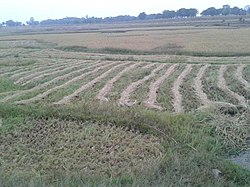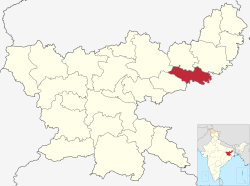Jamtara district
This article needs additional citations for verification. (May 2008) |
Jamtara district | |
|---|---|
 Field in Jamtara district | |
 Location of Jamtara district in Jharkhand | |
| Coordinates (Jamtara): 23°57′36″N 86°48′00″E / 23.96000°N 86.80000°E | |
| Country | |
| State | |
| Division | Santal Pargana |
| Headquarters | Jamtara |
| Government | |
| • Lok Sabha constituencies | 1. Dumka (shared with Dumka district) |
| • Vidhan Sabha constituencies | 3 |
| Area | |
• Total | 1,801.98 km2 (695.75 sq mi) |
| Population (2011) | |
• Total | 791,042 |
| • Density | 440/km2 (1,100/sq mi) |
| Demographics | |
| • Literacy | 64.59% |
| • Sex ratio | 959 |
| Time zone | UTC+05:30 (IST) |
| Website | jamtara |
Jamtara district is one of the twenty-four districts of Jharkhand state in eastern India. Jamtara town is the administrative headquarters of this district. The district is situated between 23°10′ and 24°05′ north latitudes and 86°30′ and 87°15′ east longitudes.
Administration
[edit]Blocks/Mandals
[edit]Jamtara district consists of 06 Blocks. The following are the list of the Blocks in Jamtara district:
Demographics
[edit]| Year | Pop. | ±% |
|---|---|---|
| 1901 | 225,405 | — |
| 1911 | 234,519 | +4.0% |
| 1921 | 224,059 | −4.5% |
| 1931 | 256,100 | +14.3% |
| 1941 | 279,114 | +9.0% |
| 1951 | 290,056 | +3.9% |
| 1961 | 324,745 | +12.0% |
| 1971 | 377,711 | +16.3% |
| 1981 | 435,284 | +15.2% |
| 1991 | 544,874 | +25.2% |
| 2001 | 653,081 | +19.9% |
| 2011 | 791,042 | +21.1% |
| Source: Census of India[1] | ||
According to the 2011 census Jamtara district has a population of 791,042,[3] roughly equal to the nation of Comoros[4] or the US state of South Dakota.[5] This gives it a ranking of 486th in India (out of a total of 640).[3] The district has a population density of 439 inhabitants per square kilometre (1,140/sq mi).[3] Its population growth rate over the decade 2001-2011 was 21%.[3] Jamtara has a sex ratio of 959 females for every 1000 males,[3] and a literacy rate of 64.59%. 9.58% of the population lives in urban areas. Scheduled Castes and Scheduled Tribes make up 9.21% and 30.40% of the population respectively.[3]
At the time of the 2011 Census of India, 30.18% of the population spoke Bengali, 29.10% Santali, 27.93% Khortha, 5.92% Hindi, 3.61% Urdu and 1.25% Magahi as their first language.[6]
Economy
[edit]In 2006 the Indian government named Jamtara one of the country's 250 most backward districts (out of a total of 640).[7] It is one of the 21 districts in Jharkhand currently receiving funds from the Backward Regions Grant Fund Programme (BRGF).[7]
Politics
[edit]There are three Vidhan Sabha constituencies in the district: Nala, Jamtara and Sarath (shared with Deoghar district). All three constituencies are part of Dumka Lok Sabha constituency.
| District | No. | Constituency | Name | Party | Alliance | Remarks | ||
|---|---|---|---|---|---|---|---|---|
| Jamtara | 8 | Nala | Rabindra Nath Mahato | Jharkhand Mukti Morcha | MGB | Speaker | ||
| 9 | Jamtara | Irfan Ansari | Indian National Congress | MGB | Cabinet minister | |||
See also
[edit]References
[edit]- ^ "Table A-02 Decadal Variation in Population Since 1901: Jharkhand" (PDF). census.gov.in. Registrar General and Census Commissioner of India.
- ^ "Table C-01 Population By Religion: Jharkhand". census.gov.in. Registrar General and Census Commissioner of India.
- ^ a b c d e f "District Census Handbook: Jamtara" (PDF). censusindia.gov.in. Registrar General and Census Commissioner of India. 2011.
- ^ US Directorate of Intelligence. "Country Comparison:Population". Archived from the original on June 13, 2007. Retrieved 2011-10-01.
Comoros 794,683 July 2011 est.
- ^ "2010 Resident Population Data". U. S. Census Bureau. Archived from the original on 2013-10-19. Retrieved 2011-09-30.
South Dakota 814,180
- ^ a b "Table C-16 Population by Mother Tongue: Jharkhand". censusindia.gov.in. Registrar General and Census Commissioner of India.
- ^ a b Ministry of Panchayati Raj (September 8, 2009). "A Note on the Backward Regions Grant Fund Programme" (PDF). National Institute of Rural Development. Archived from the original (PDF) on April 5, 2012. Retrieved September 27, 2011.


